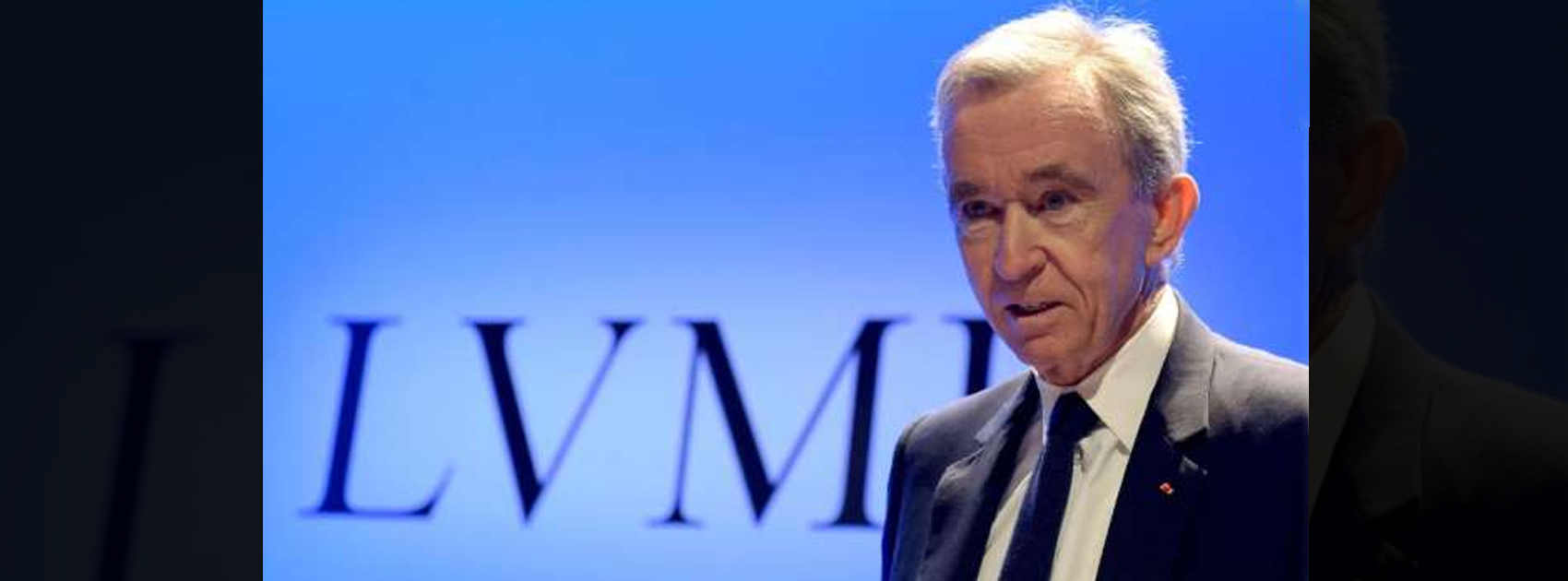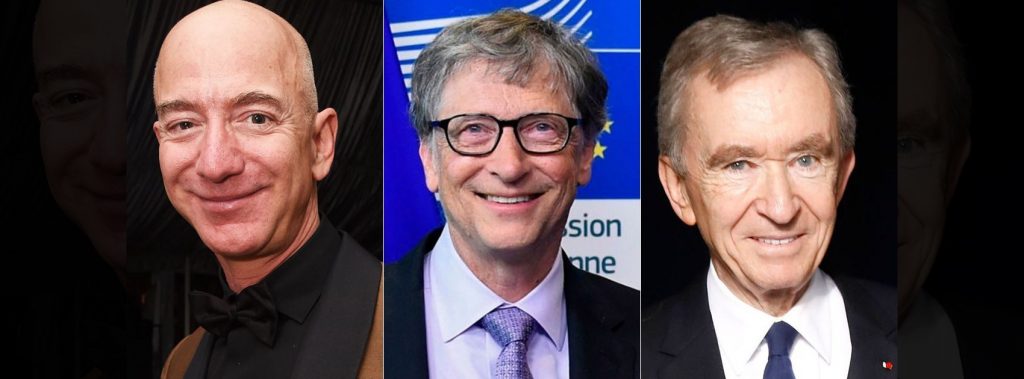News
Bernard Arnault Replaces Bill Gates As Second Richest Man In The World

According to a report released by Bloomberg, Bill Gates, the co founder of Microsoft, was replaced as the world’s second richest person by Bernard Arnault, the Chairman of LVMH. Bill Gates was ranked as the 2nd richest person in Bloomberg’s Billionaires Index for the last 7 years. However, he was replaced by Arnault after the French businessman added $ 39 billion in 2019 to his wealth, pushing his net worth to $ 108 billion.
Arnault, aged 70, joined world’s most exclusive wealth club after Jeff Bezos and Bill Gates, when his fortune surpassed the $ 100 billion mark for the first time in June 2019. As the chairman and CEO of the luxury goods maker LVMH, most of Arnault’s wealth comes from his holdings in Louis Vuitton and Christian Dior. He holds a 97 % stake in Christian Dior. Apart from Louis Vuitton, Bernard also oversees 70 other luxury good companies like Givenchy, Marc Jacobs, Sephora and Fendi, to name a few.
Arnault and his family are among the list of luxury titans who pledged more than $ 650 million for the reconstruction of the Notre Dame Cathedral, which was destroyed by a massive fire in April 2019.

Bill Gates, with a net worth of $ 107 billion, lost the title of being the world’s second richest man because of his philanthropic work. Gates donated over $ 35 billion to the Bill and Melinda Gates Foundation, founded in 2000 by him and his wife Melinda Gates. The primary focus of the Foundation is to enhance healthcare and reduce extreme poverty. Amazon’s Bezos’ net worth was up slightly this year to $ 125 billion, despite his divorce settlement with his former wife MacKenzie Bezos, which saw MacKenzie keep 4% stake in his multinational technology company. This made MacKenzie Bezos the 4th richest woman in the world.
Declared the richest man in Europe, Bernard Arnault has been climbing the ladder to success continuously. His $ 39 billion addition to his wealth in 2019 alone, according to Bloomberg, is the biggest individual gain among the 500 people it ranks.
Funding
Dazzl Raises $3.2M Seed Funding Led by OYO’s Ritesh Agarwal for AI Skincare Expansion

Bengaluru, January 13, 2026 Dazzl, the D2C beauty startup revolutionizing AI personalized skincare India, secured $3.2 million in seed funding led by OYO founder Ritesh Agarwal’s venture arm. Co-investors include Snapdeal’s Rohit Bansal and Fireside Ventures, valuing Dazzl at $15 million post-money. Founded in 2024 by IIT alumni Priya Singh and Arjun Mehta, the app uses smartphone scans for custom serums, boasting 50,000+ users and ₹5 crore ARR amid India’s $25 billion beauty market surge.
Ritesh Agarwal praised Dazzl’s tech: “Personalization is beauty’s future, like OYO’s guest model.” Funds target R&D for 100+ skin profiles, Gujarat manufacturing under PLI, Instagram/Nykaa campaigns, and 50 hires. In a 20% YoY growing sector (Redseer 2025), Dazzl edges Mamaearth and Plum with 95% AI precision, 90% natural formulas, ₹499 kits, 65% retention (vs. 40% avg), and viral TikTok traction in 10 cities.
D2C beauty startup Dazzl tackles regulations via FSSAI compliance, eyeing $10B e-commerce beauty by 2028 and MENA exports. Q2 haircare launches and Series A loom, with Agarwal’s backing signaling unicorn potential for sustainable beauty products India. Dazzl blends AI with clean beauty for 500M+ consumers.
News
Google Launches Startup Hub in Hyderabad to Boost India’s Innovation Ecosystem

Google has launched the Google Startup Hub Hyderabad, a major step in strengthening India’s dynamic startup ecosystem. This new initiative aims to empower entrepreneurs, innovators, and developers by giving them access to Google’s global expertise, mentoring programs, and advanced cloud technology. The hub reflects Google’s mission to fuel India’s digital transformation and promote innovation through the Google for Startups program.
Located in the heart of one of India’s top tech cities, the Google Startup Hub in Hyderabad will host mentorship sessions, training workshops, and networking events designed for early-stage startups. Founders will receive Google Cloud credits, expert guidance in AI, product development, and business scaling, and opportunities to collaborate with Google’s global mentors and investors. This ecosystem aims to help Indian startups grow faster and compete globally.
With Hyderabad already home to tech giants like Google, Microsoft, and Amazon, the launch of the Google Startup Hub Hyderabad further cements the city’s position as a leading innovation and technology hub in India. Backed by a strong talent pool and robust infrastructure, this hub is set to become a growth engine for next-generation startups, driving innovation from India to global markets.
News
BMW’s New Logo Debuts Subtly on the All-Electric iX3: A Modern Evolution

BMW quietly debuted its new logo on the all-electric iX3, marking a significant yet understated shift in the brand’s design direction for 2025. The updated emblem retains the classic roundel and Bavarian blue-and-white colors, but sharp-eyed enthusiasts noticed subtle refinements: the inner chrome ring has been removed, dividing lines between blue and white are gone, and the logo now features a contemporary satin matte black background with slimmer “BMW” lettering. These enhancements showcase BMW’s embrace of modern minimalism while reinforcing their commitment to premium aesthetics and the innovative Neue Klasse philosophy for future electric vehicles.
Unlike rival automakers that reveal dramatic logo changes, BMW’s refresh is evolutionary and respectful of tradition. The new badge ditches decorative chrome and blue borders associated with earlier electric models, resulting in a flatter, more digital-friendly design that mirrors recent branding seen in BMW’s digital communications. Appearing first on the iX3’s nose, steering wheel, and hub caps, this updated identity will gradually be adopted across all BMW models—both electric and combustion—signaling a unified brand language for years to come.
BMW’s strategic logo update represents more than just aesthetic reinvention—it underscores the brand’s dedication to future-ready mobility, design continuity, and a premium EV experience. As the new roundel begins rolling out on upcoming BMW vehicles, it stands as a testament to the automaker’s depth of detail and thoughtful evolution, offering subtle distinction for keen observers and affirming BMW’s iconic status in the ever-changing automotive landscape.













Ljdxgufz
May 27, 2025 at 8:31 am
Explore the ranked best online casinos of 2025. Compare bonuses, game selections, and trustworthiness of top platforms for secure and rewarding gameplaycasino bonus.
iwin
November 7, 2025 at 4:57 am
iwin – nền tảng game bài đổi thưởng uy tín, nơi bạn có thể thử vận may và tận hưởng nhiều tựa game hấp
MM88
November 10, 2025 at 4:33 am
Với giao diện mượt mà và ưu đãi hấp dẫn, MM88 là lựa chọn lý tưởng cho các tín đồ giải trí trực tuyến.
ios超级签
November 10, 2025 at 5:13 am
苹果签名,苹果超级签平台,ios超级签平台ios超级签苹果企业签,苹果超级签,稳定超级签名
谷歌站群
November 13, 2025 at 3:37 pm
专业构建与管理谷歌站群网络,助力品牌实现全域流量的强势增长。谷歌站群
J88
November 14, 2025 at 10:20 am
Đến với J88, bạn sẽ được trải nghiệm dịch vụ cá cược chuyên nghiệp cùng hàng ngàn sự kiện khuyến mãi độc quyền.
GO88
November 23, 2025 at 3:34 pm
Tham gia cộng đồng game thủ tại Go88 để trải nghiệm các trò chơi bài, poker phổ biến nhất hiện nay.
Kuwin
November 26, 2025 at 8:45 am
kuwin sở hữu kho game đa dạng từ slot đến trò chơi bài đổi thưởng, mang đến cho bạn những giây phút giải trí tuyệt vời.
MM88
November 30, 2025 at 5:29 pm
Khám phá thế giới giải trí trực tuyến đỉnh cao tại MM88, nơi mang đến những trải nghiệm cá cược thể thao và casino sống động.
kostenlose freispiele 1go casino
December 21, 2025 at 6:31 am
Unsere kontinuierlichen Promotions orientieren sich am
deutschen Kalender und lokalen Ereignissen. Die Bonusbedingungen werden in deutscher Sprache vollständig erklärt und entsprechen den strengen deutschen Verbraucherschutzbestimmungen. Die 300 Freispiele verteilen sich strategisch über
zehn Tage mit jeweils 30 täglichen Spins auf Premium-Spielautomaten deutscher Anbieter.
Das Cadoola Casino etabliert sich als führende Online-Gaming-Plattform im deutschen Markt
seit der Gründung 2017. Sie haben alles, von Slots bis zu Tischspielen und sogar Live-Casinospielen.
Spezielle deutsche Live-Tische bieten Oktoberfest-Roulette im September, Weihnachts-Blackjack im Dezember und andere saisonale Variationen. HD-Übertragungen mit 4K-Option bieten perfekte Bildqualität über deutsche Internetverbindungen. Amerikanisches Roulette bleibt verfügbar für Abwechslung, während französisches Roulette mit La Partage-Regel die niedrigste Hausbank bietet.
Europäisches Roulette dominiert mit 15 verschiedenen Varianten, da deutsche Spieler die besseren Gewinnchancen der Einzelnull-Version bevorzugen.
Der Kundensupport ist auf Deutsch und ihr könnt mobil vom Handy
und Tablet spielen. Der Willkommensbonus für deutsche Spieler beläuft sich
auf 120 % bis zu 800 € + 250 Freispiele. Casino Poker bietet
Texas Hold’em, Three Card Poker und Caribbean Stud mit deutschen Dealer-Anweisungen. Multihand-Blackjack ermöglicht bis zu fünf simultane Hände
für erfahrene deutsche Kartenspieler.
References:
https://online-spielhallen.de/beep-beep-casino-erfahrungen-ein-detaillierter-blick/
b2xbet
February 1, 2026 at 8:58 am
My spouse and I stumbled over here different web page and thought I might as well check things out. I like what I see so now i am following you. Look forward to looking over your web page for a second time.